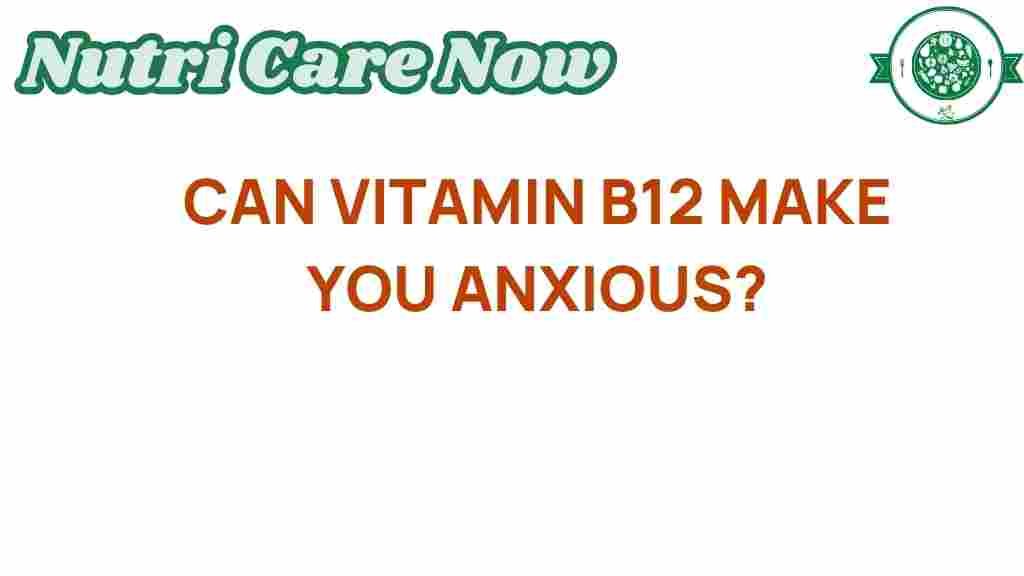The Surprising Link Between Vitamin B12 and Anxiety Levels
Anxiety is a common mental health issue affecting millions of people worldwide. As we continue to explore the factors that contribute to anxiety levels, one surprising link has emerged: Vitamin B12. This essential nutrient plays a crucial role in various bodily functions, especially concerning the nervous system and mental health. In this article, we will delve into the connection between Vitamin B12 and anxiety, how deficiency can affect health, and the role of nutrition and supplements in promoting wellness.
Understanding Vitamin B12
Vitamin B12, also known as cobalamin, is a water-soluble vitamin that is vital for several bodily functions, including:
- Red blood cell formation
- DNA synthesis
- Neurological function
It is found naturally in animal products such as meat, dairy, and eggs, which means that individuals following a vegan or vegetarian diet may be at a higher risk for a Vitamin B12 deficiency. This deficiency can lead to a range of health problems, including anemia and neurological issues.
The Connection Between Vitamin B12 and Anxiety
Research has shown that there is a significant relationship between Vitamin B12 levels and anxiety. Here’s how Vitamin B12 influences mental health:
- Neurological Function: Vitamin B12 is essential for maintaining the health of nerve cells. A deficiency can lead to neurological impairments, which may manifest as anxiety or mood disorders.
- Homocysteine Regulation: Vitamin B12 helps regulate homocysteine levels in the body. Elevated homocysteine is linked to increased risk of anxiety and depression.
- Serotonin Production: Vitamin B12 is involved in the production of serotonin, a neurotransmitter that plays a crucial role in mood regulation. Low serotonin levels are associated with anxiety and depression.
Identifying Vitamin B12 Deficiency
Many people are unaware that they may be suffering from a Vitamin B12 deficiency. Common symptoms include:
- Fatigue and weakness
- Pale or jaundiced skin
- Nerve problems like tingling or numbness
- Balance issues
- Memory difficulties
- Increased anxiety or mood changes
If you suspect a deficiency, it is essential to consult a healthcare professional for appropriate testing and diagnosis.
Step-by-Step: Improving Vitamin B12 Levels
Here’s a step-by-step guide to improving your Vitamin B12 levels and potentially reducing anxiety:
Step 1: Evaluate Your Diet
Start by assessing your diet. Are you consuming enough Vitamin B12-rich foods? Consider including:
- Meat and poultry
- Fish
- Dairy products
- Eggs
- Fortified cereals and plant-based milks
Step 2: Consider Supplements
If you are unable to meet your Vitamin B12 needs through diet alone, supplements may be necessary. Here are some options:
- Vitamin B12 Tablets: These are available in various dosages.
- Vitamin B12 Injections: Often recommended for severe deficiencies.
- Vitamin B12 Nasal Sprays: A convenient alternative for those who may have absorption issues.
Before starting any supplements, it is essential to consult with a healthcare provider.
Step 3: Monitor Your Health
Keep track of your symptoms and mental health as you work on increasing your Vitamin B12 intake. Improvements in energy levels, mood, and anxiety symptoms can often be observed within weeks.
Troubleshooting Tips
If you are following the steps above and still experiencing anxiety, consider these troubleshooting tips:
- Consult a Professional: If anxiety persists, it may be beneficial to seek help from a mental health professional.
- Review Your Medications: Some medications can interfere with Vitamin B12 absorption. Discuss your current medications with your doctor.
- Check for Other Nutrient Deficiencies: Other vitamins and minerals, such as Vitamin D and magnesium, also play a role in mental health. A balanced diet is key.
Conclusion
The connection between Vitamin B12 and anxiety levels is an important aspect of mental health and wellness. Ensuring adequate intake of this vital nutrient can positively influence your nervous system and help manage anxiety symptoms. Nutrition, supplements, and a holistic approach to health are essential for maintaining overall well-being.
For more information on vitamins and mental health, you can explore this comprehensive guide on nutrition and wellness.
Remember, if you suspect you have a deficiency or are experiencing anxiety, consulting a healthcare professional is crucial for proper diagnosis and treatment.
By prioritizing your Vitamin B12 intake and addressing any deficiencies, you can take a significant step towards better mental health and overall wellness.
This article is in the category Health and created by NutriCareNow Team
